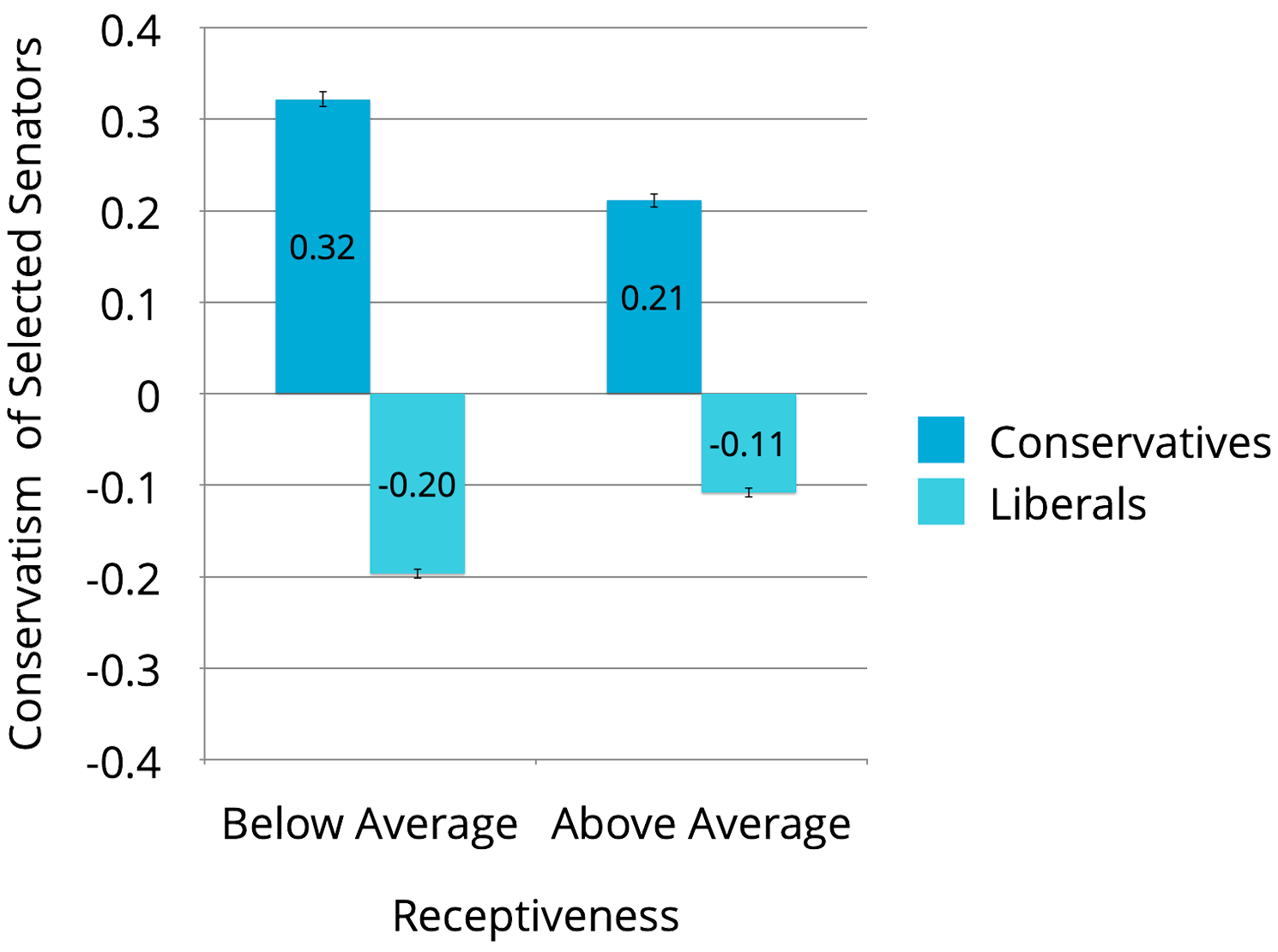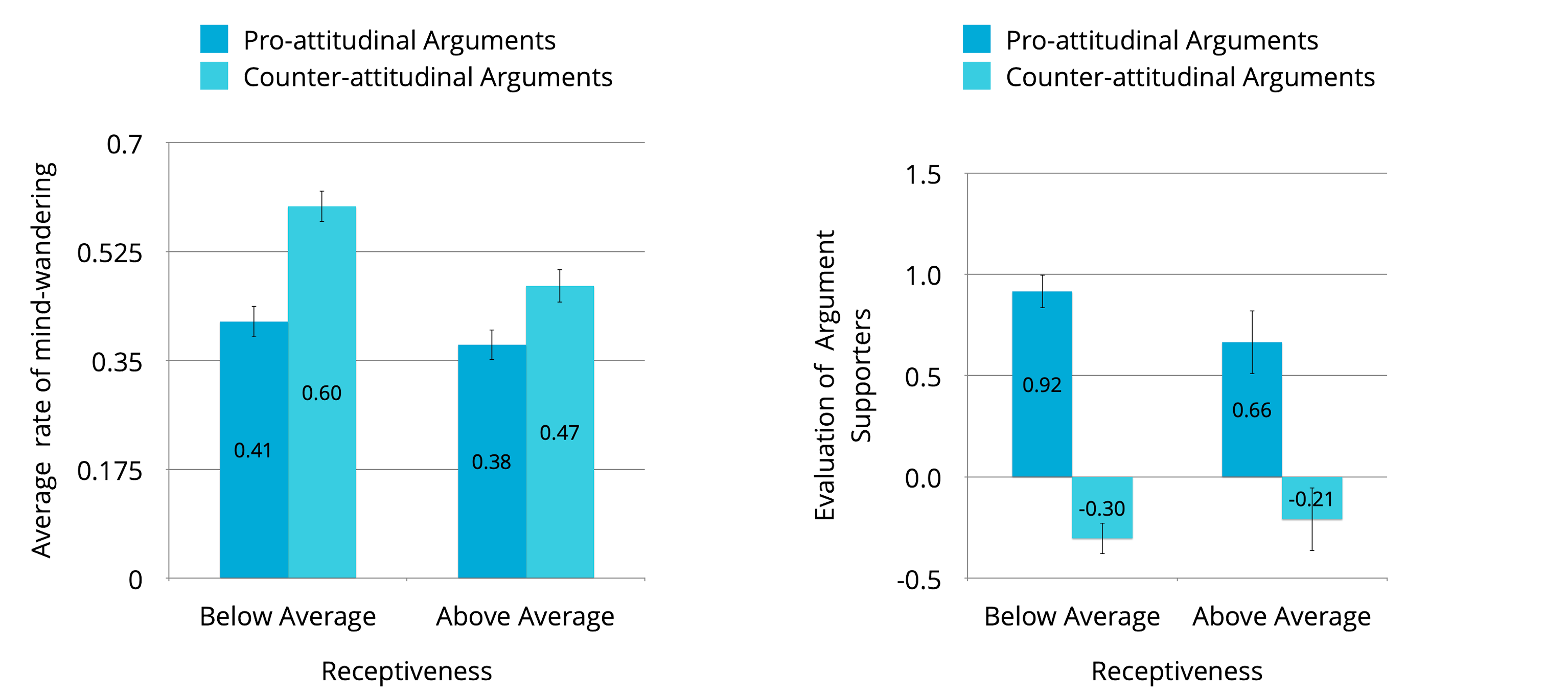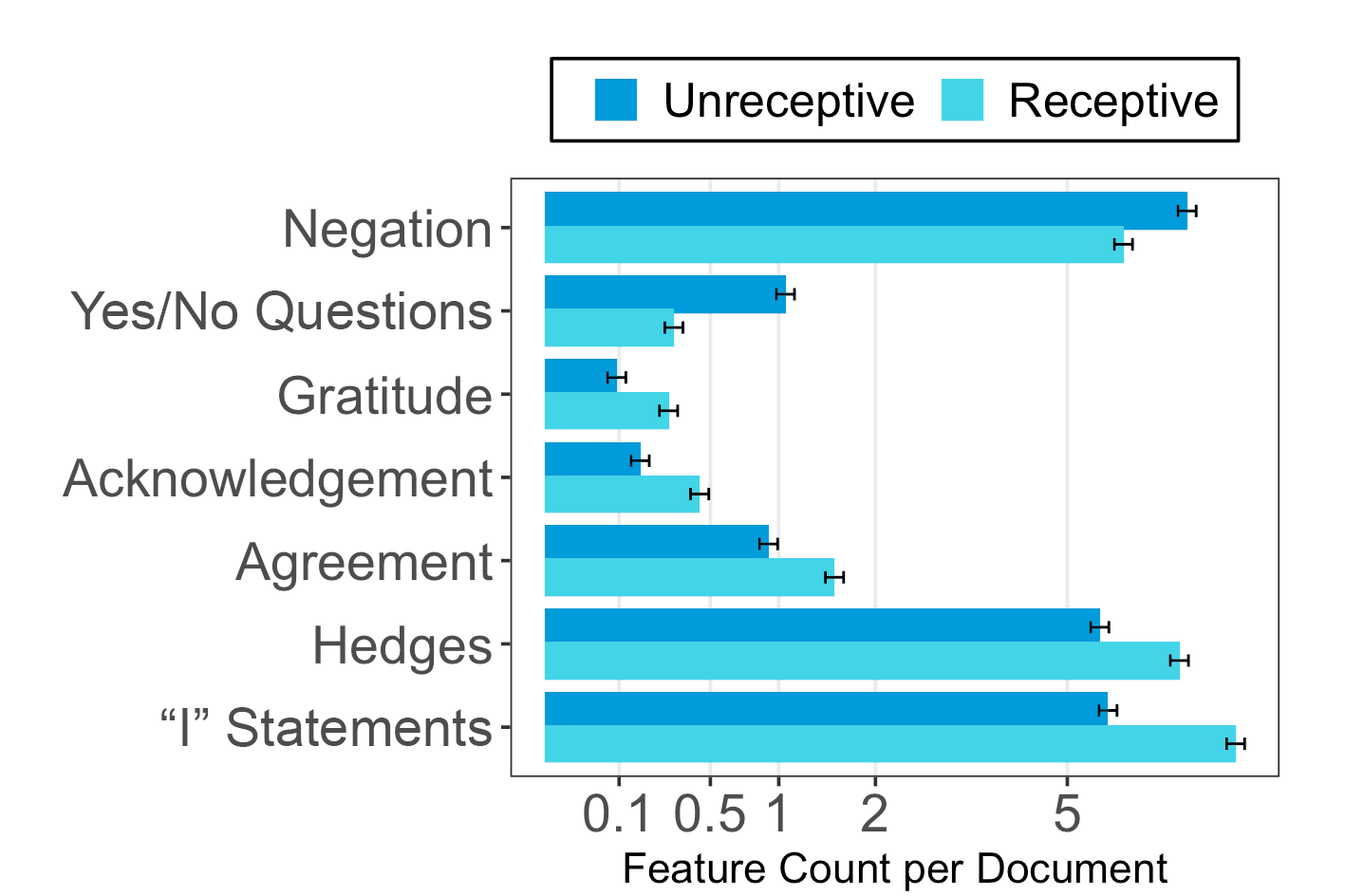the Research
For more information and related research visit Julia Minson's Website.
Receptiveness and consumption of political information

Why Won’t You Listen to Me? Measuring Receptiveness to Opposing Views
How do we measure if someone is receptive and what does that mean? In this paper we first present the questions used in our survey, and show that how people answer predicts their behavior. For example, liberal voters who reported being more receptive prior to the 2016 presidential election were more likely to watch President Trump’s inauguration than their less receptive counterparts.
Article Abstract
We develop an 18-item self-report measure of receptiveness to opposing views. Studies 1a and 1b present the four-factor scale and report measures of internal, convergent, and discriminant validity. In study 2, more receptive individuals chose to consume proportionally more information from U.S. senators representing the opposing party than from their own party. In study 3, more receptive individuals reported less mind wandering when viewing a speech with which they disagreed, relative to one with which they agreed. In study 4, more receptive individuals evaluated supporting and opposing policy arguments more impartially. In study 5, we find that voters who opposed Donald Trump but reported being more receptive at the time of the election were more likely to watch the inauguration, evaluate the content of the inauguration speech in a more even-handed manner, and select a more balanced portfolio of news outlets for later consumption than their less receptive counterparts. We discuss the scale as a tool to investigate the role of receptiveness for conflict, decision making, and collaboration.
Receptiveness and attention
Receptiveness and judgments of others

Linguistic markers of receptiveness

Conversational receptiveness: Improving engagement with opposing views
How can people tell if you are being receptive or not? In this paper, we develop a natural language processing algorithm that captures specific words and phrases that signal receptiveness to others. People who are seen as receptive by their conflict counterparts are better liked, seen as having better judgment, and are more likely to persuade others. Test your writing to see how receptive you sound!
Article Abstract
We examine “conversational receptiveness” – the use of language to communicate one’s willingness to thoughtfully engage with opposing views. We develop an interpretable machine-learning algorithm to identify the linguistic profile of receptiveness (Studies 1A-B). We then show that in contentious policy discussions, government executives who were rated as more receptive - according to our algorithm and their partners, but not their own self-evaluations - were considered better teammates, advisors, and workplace representatives (Study 2). Furthermore, using field data from a setting where conflict management is endemic to productivity, we show that conversational receptiveness at the beginning of a conversation forestalls conflict escalation at the end. Specifically, Wikipedia editors who write more receptive posts are less prone to receiving personal attacks from disagreeing editors (Study 3). We develop a “receptiveness recipe” intervention based on our algorithm. We find that writers who follow the recipe are seen as more desirable partners for future collaboration and their messages are seen as more persuasive (Study 4). Overall, we find that conversational receptiveness is reliably measurable, has meaningful relational consequences, and can be substantially improved using our intervention (183 words).
Receptiveness and friendship

Mutual Receptiveness to Opposing Views Bridges Ideological Divides in Network Formation
People usually form social networks with others that are similar to them. This is called “homophily.” In this paper we study the effect of receptiveness on the social networks of graduate students in three different universities. We find that students who are more receptive, form network ties with more politically diverse counterparts, especially if those counterparts are also highly receptive.
Article Abstract
We examine how an individual difference—receptiveness to opposing views—moderates the tendency for people to sort into ideologically homogeneous social groups. Although prior work has linked receptiveness to willingness to engage information from opposing ideological perspectives, its consequences for network formation have yet to be explored. Study 1 (N = 1,793) demonstrates in a lab setting that receptiveness is associated with forming relationships with ideologically opposed others. Yet preferences and relationship overtures are not always reciprocated. Study 2 (N = 599), a longitudinal field study conducted at three universities where students span the ideological spectrum, shows that individual receptiveness does not always translate into politically heterogeneous relationships. Instead, such relationships tend to form when two individuals are mutually receptive. Additionally, we find mutual receptiveness increases the likelihood that majority group members will initiate relationships with those in the minority. We discuss implications for research on personality and social networks.
Tell me more: The effects of expressed interest on receptiveness during dialog
Article Abstract
Two studies investigated the effect of expressed interest on individuals’ openness to opposing viewpoints and perceptions of debate counterparts. Participants in Study 1 engaged in an online conversation with a purported debate counterpart who did or did not express interest in the participants’ viewpoint by asking an elaboration question—that is, a question geared at soliciting additional information. Compared to control participants, participants who received a question rated their debate counterpart more favorably, were more willing to engage in future interaction with their counterpart, and acted in a more receptive manner. Study 2 tested the effects of instructions to prepare elaboration questions on listeners’ responses to a speaker offering counter-attitudinal arguments. Preparing questions caused participants to be more open to the idea of having a conversation with the speaker, to make more positive attributions about typical proponents of the speaker’s viewpoint, and to judge the conclusions of the speech as more valid. Theoretical and practical implications of this research are discussed.
In the Eye of the Beholder: Eye Contact Increases Resistance to Persuasion
Article Abstract
Popular belief holds that eye contact increases the success of persuasive communication, and prior research suggests that speakers who direct their gaze more toward their listeners are perceived as more persuasive. In contrast, we demonstrate that more eye contact between the listener and speaker during persuasive communication predicts less attitude change in the direction advocated. In Study 1, participants freely watched videos of speakers expressing various views on controversial sociopolitical issues. Greater direct gaze at the speaker’s eyes was associated with less attitude change in the direction advocated by the speaker. In Study 2, we instructed participants to look at either the eyes or the mouths of speakers presenting arguments counter to participants’ own attitudes. Intentionally maintaining direct eye contact led to less persuasion than did gazing at the mouth. These findings suggest that efforts at increasing eye contact may be counterproductive across a variety of persuasion contexts.












